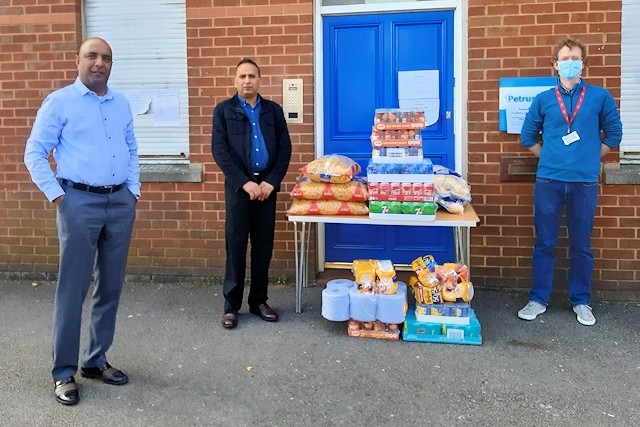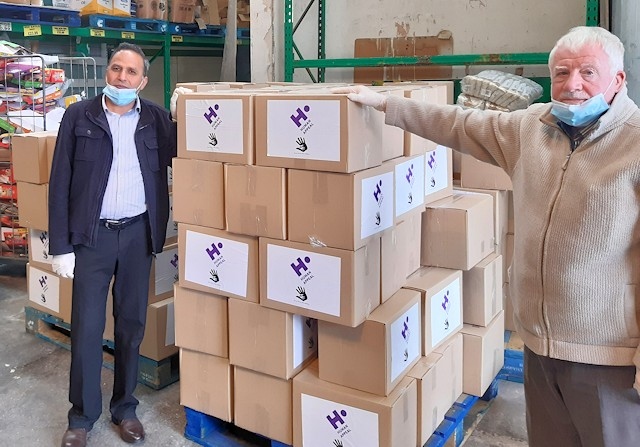Being a councillor in the time of Covid-19
Date published: 09 July 2020

Councillor Aftab Hussain and Councillor Shakil Ahmed with Edmund Clout, Service Manager at Petrus
Kingsway ward councillor Shakil Ahmed shares his experience of how the Covid-19 pandemic has impacted everyday life, and how it has affected councillor duties.
As councils grapple with the worst public health crisis we have experienced in a century, it’s certainly made a difference to how we can operate as councillors.
Most of our council meetings are not taking place and things like the townships, community groups and local forums where we can meet with the public and hear their views are unable to meet although we did manage a township on Zoom but without the public being able to participate. April and May are, though, usually a bit quieter due to local elections although these are suspended until May 2021.
Rochdale Council has had to take on many extra duties to protect our vulnerable residents and to support businesses through various measures introduced by the government but administered by the council and to change its way of working which, in some ways, has made a councillor’s job more difficult as officers from some departments to whom we could usually speak to sort out residents’ and businesses’ issues have been moved to other duties.
A crucial role for councillors during this crisis has been community engagement; not only because of the immediate risk to residents' health and the health of their loved ones, but also because of the consequential pressure on other aspects of their lives including accessing food and provisions, job security, and navigating the benefits and sick pay processes.
The crisis has exacerbated many existing issues such as abusive domestic settings, social isolation, mental health issues and safety. We know that the virus impacts more heavily upon the elderly and those with other health conditions. Additional pressure on the council's adult care service in the form of higher illness rates, lack of equipment, staff shortages and the limitations imposed by self-isolation or wider lock-down measures, have certainly exacerbated the pre-existing capacity issues and these certainly need to addressed in the future, but I feel Rochdale council officers and councillors can be proud of our response. I would also like to thank the many volunteers and good neighbours who have done so much to support the vulnerable and isolated.
Personally – but I know this is true for most of our councillors – I have spent a lot of time Identifying and making contacts with vulnerable residents although, because of lockdown, this has usually been by telephone.

Meetings have been very limited. I am the chairperson of the planning and licensing committee; we are hoping to have public participation at our June meeting using Zoom. As the lockdown is gradually relaxed, I hope we can get back to much more normality where, albeit with safety measures in place, residents can once again participate. I am also on the highways committee so continue to monitor our road improvement programme throughout Kingsway ward.
Our volume of casework has, if anything, gone up and problems such as fly tipping have increased greatly whilst the recycling centres were closed. Fortunately, they are now fully open again to residents.
The coronavirus outbreak has had a huge impact on both individuals and businesses with many seeking help, and almost everyone affected in one way or another. Rochdale Council has done a great deal to support local care homes and has one of the best records in Greater Manchester.
I work as a HGV driver for Allied Bakeries, which I have done for over 20 years. During the Covid-19 crisis I’ve been working extra shifts to cover for colleagues who are self-isolating or shielding but also to cope with the huge extra demand which saw our normal production and deliveries increase by 20% so just on a work front I’ve been extra busy.
The company has also delivered to front-line workers as well as some of the most vulnerable in society. During the crisis, I have been working with some businesses to support local charities and groups and we have had some very generous donations to assist both the homeless and deprived communities. I have been a member of my union also for the last 20 years and one of the few good things we have seen during the crisis is the growth of trade union membership in all sectors. We are stronger together than alone, so long may this growth continue.
Until the coronavirus crisis, I just thought of myself as doing an everyday job, but, like so many others in a huge range of jobs who have continued to risk their health and continued to work to keep services going, I have become a ‘key’ or ‘frontline’ worker.
Like so many of us, I have clapped for the wonderful NHS workers who have had to cope with shortages, but there are so many other undervalued workers who have kept life going for us all; care home workers, all drivers delivering to our supermarkets and our homes, our post men and women, our binmen, our emergency workers, those working in our shops and supermarkets, our council staff and public transport workers and too many others to name who have been taken for granted for far too long.
Let us hope that the government’s promises for a fairer society are not just empty words but we ourselves can also start to look at and understand who really make our lives normal and expectations possible.
Last but not least, the government has announced an inquiry into the disproportionate impact of the coronavirus on black and minority ethnic people. They make up 14% of our population but are 35% of those who are in intensive care and 60% of all healthcare staff who have died from the virus are from the BAME community.
The Covid-19 crisis has put a spotlight on some of the deep inequalities and dysfunctions of our society and economy. Let’s hope that the inquiry is a genuine attempt to understand and, more importantly, deal with, the issues of systemic racism which still sadly exist.
Do you have a story for us?
Let us know by emailing news@rochdaleonline.co.uk
All contact will be treated in confidence.
Most Viewed News Stories
- 1Royton haulage firm fined after Rochdale dad went to work and didn’t come home
- 2Six men arrested in Rochdale child exploitation investigation
- 3Newhey's Char Steakhouse and Bank Chamber close with immediate effect
- 4Suspended council candidate was ‘politically naive’ for appearing in George Galloway video, leader...
- 5Rochdale church to host Camerados public living room
To contact the Rochdale Online news desk, email news@rochdaleonline.co.uk or visit our news submission page.
To get the latest news on your desktop or mobile, follow Rochdale Online on Twitter and Facebook.


